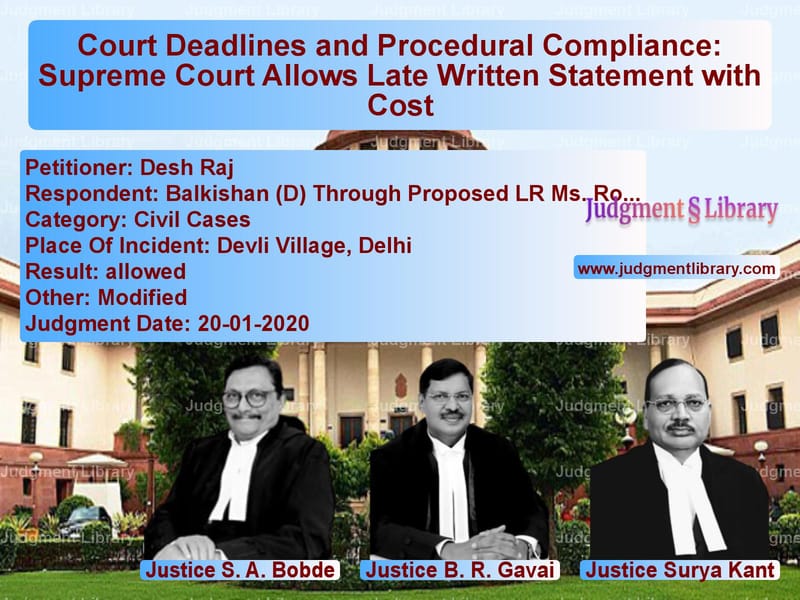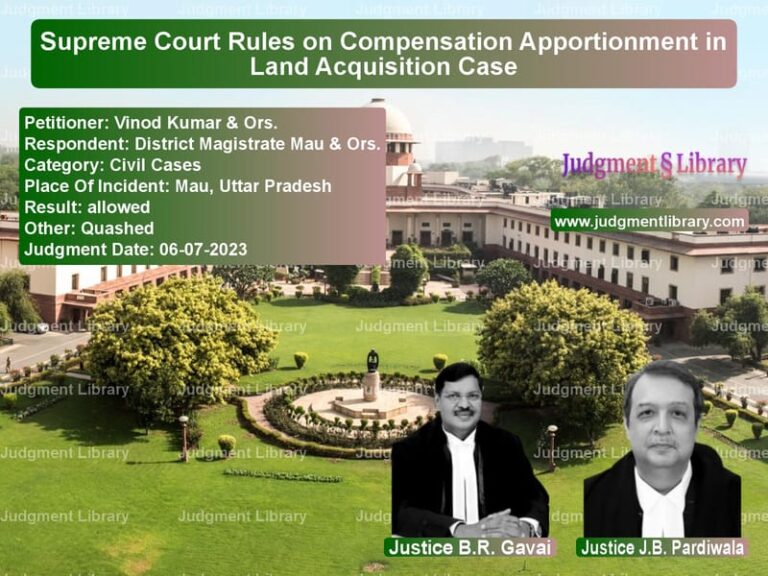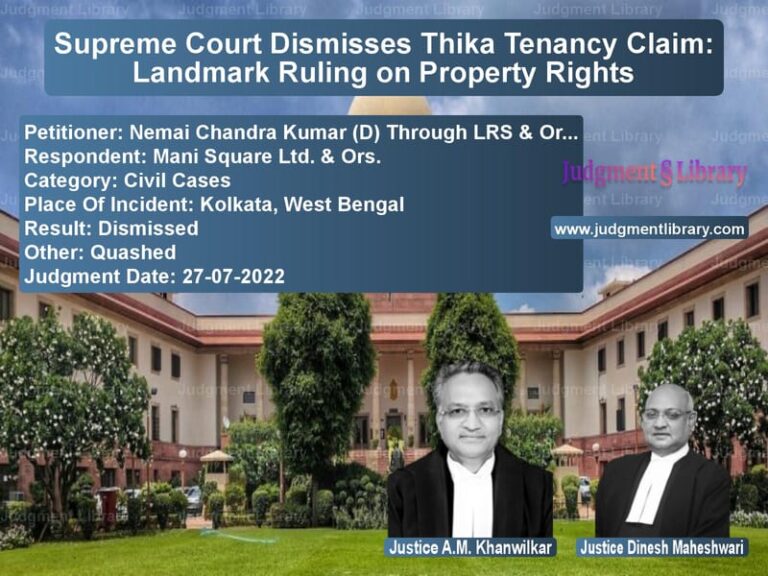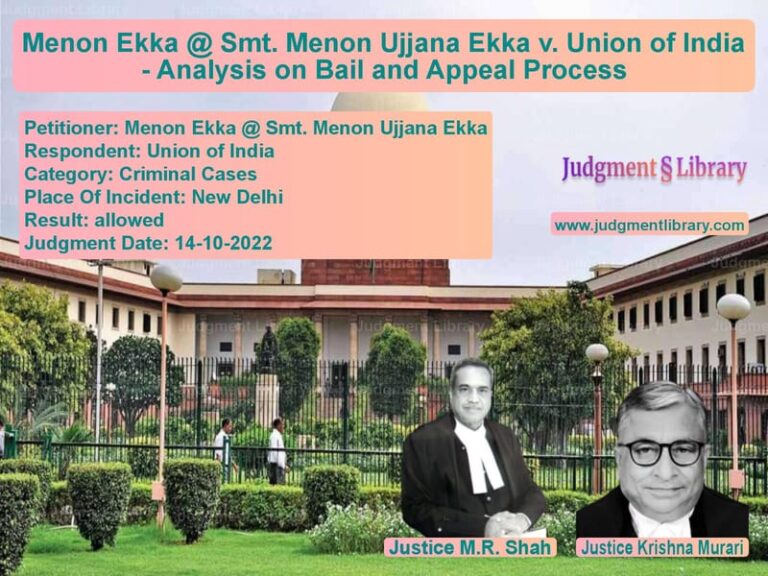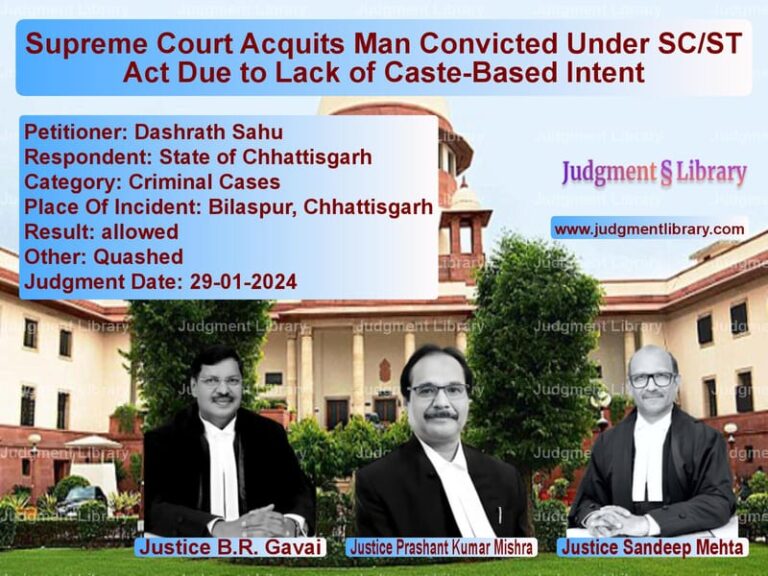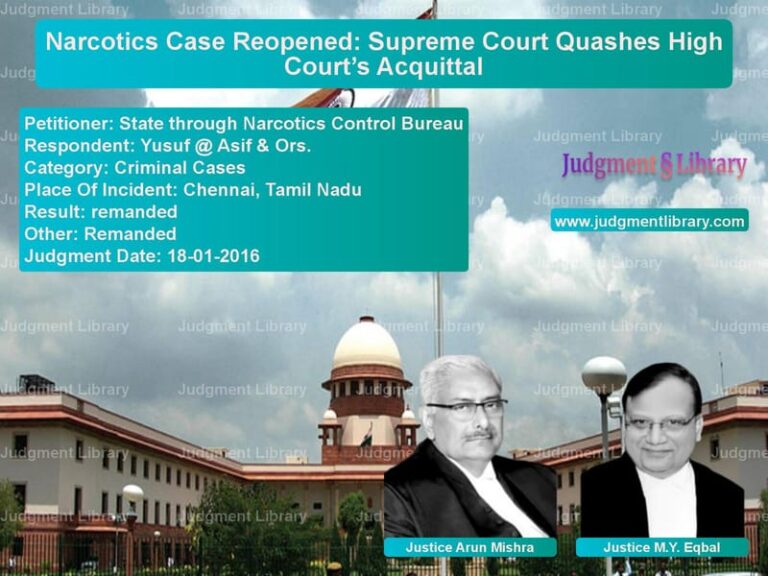Court Deadlines and Procedural Compliance: Supreme Court Allows Late Written Statement with Cost
The case of Desh Raj vs. Balkishan (D) Through Proposed LR Ms. Rohini revolves around the procedural limitations of filing a written statement in a civil suit. The dispute primarily concerns a missed deadline, the discretion of courts to allow delays, and whether procedural rules can be relaxed in non-commercial disputes. The Supreme Court’s judgment clarifies the legal position on filing delays and reiterates the importance of respecting court deadlines while also considering exceptional circumstances.
The dispute arose from a property sale agreement between two brothers regarding an ancestral property in Devli Village, Delhi. The respondent, Balkishan, sought specific performance of the agreement, alleging that the appellant, Desh Raj, failed to honor the contract. When Desh Raj repeatedly failed to file a written statement in response to the suit, the trial court closed his right to file a defense. The Delhi High Court upheld this decision, relying on previous rulings that imposed strict deadlines for filing written statements. However, the Supreme Court found that the High Court had incorrectly applied a precedent meant for commercial disputes and exercised its discretion to allow the late filing, subject to a cost.
Background of the Case
The appellant and the respondent, both brothers, owned separate floors of an ancestral property. In February 2017, Balkishan proposed to purchase the first floor from Desh Raj. They executed an agreement to sell on March 17, 2017, for a total consideration of Rs. 7.5 lakhs, with Rs. 1 lakh paid as earnest money.
However, Desh Raj did not fulfill his obligations under the agreement. Balkishan served a legal notice on April 13, 2017, demanding that the sale be completed. When Desh Raj failed to comply, Balkishan filed a civil suit seeking specific performance of the agreement or, alternatively, damages of Rs. 2 lakhs with interest.
Trial Court Proceedings
The trial court served notice on Desh Raj on May 1, 2017, requiring him to file a written statement. He appeared on May 15, 2017, and was granted 30 days to file his response. However, he repeatedly failed to submit his written statement despite multiple extensions:
- July 17, 2017: The trial court granted a final two-week extension.
- September 18, 2017: Another extension was granted, subject to a Rs. 3,000 cost.
- October 11, 2017: After several delays and pass-overs, the court struck off the appellant’s defense.
- November 2, 2017: The appellant finally claimed to have filed the written statement, but even by November 3, it was not shared with the respondent.
High Court Proceedings
The appellant approached the Delhi High Court, which dismissed his petition, ruling that the 120-day deadline for filing a written statement was absolute. The High Court relied on Oku Tech Pvt. Ltd. v. Sangeet Agarwal & Ors., which held that courts had no discretion to allow a written statement beyond the prescribed time limit in commercial disputes.
Supreme Court’s Analysis
The Supreme Court examined two key issues:
1. Applicability of Strict Deadlines in Non-Commercial Disputes
The Court distinguished between commercial and non-commercial disputes. The Commercial Courts Act, 2015, amended the Code of Civil Procedure (CPC) to impose stricter timelines for commercial cases. However, the present case was not a commercial dispute, as it involved an ancestral property sale between family members. The Court clarified:
“There are two regimes of civil procedure. Whereas commercial disputes are governed by the CPC as amended by the Commercial Courts Act, 2015, all other non-commercial disputes fall within the ambit of the unamended provisions of CPC.”
2. Discretion to Allow Delayed Filing in Non-Commercial Cases
The Court reiterated that, in non-commercial cases, courts retain discretion to extend deadlines based on circumstances. It cited previous rulings, including Atcom Technologies Ltd. v. Y.A. Chunawala & Co., which held that unamended Order VIII Rule 1 CPC is directory, not mandatory.
The Court emphasized:
“Although the unamended Order VIII Rule 1 of CPC is directory, it cannot be interpreted to bestow a free hand on any litigant or lawyer to file written statements at their own sweet will and/or to prolong litigation.”
Final Judgment
The Supreme Court found that Desh Raj had been negligent in missing multiple deadlines but noted that the High Court had wrongly relied on a precedent meant for commercial cases. As a result, the Court allowed the delayed written statement to be taken on record, subject to a penalty:
- The written statement filed on November 2, 2017, was accepted.
- The appellant was directed to pay Rs. 25,000 as costs to the respondent.
- The orders of the lower courts were set aside.
Key Takeaways
- Strict deadlines apply only to commercial disputes under the Commercial Courts Act, 2015.
- Non-commercial cases allow judicial discretion in extending deadlines for filing written statements.
- Repeated failure to meet deadlines may lead to severe consequences, including striking off defenses.
- Courts must balance procedural compliance with fairness to prevent abuse of the legal process.
Conclusion
This judgment reinforces the importance of respecting court deadlines while recognizing that procedural laws in non-commercial cases allow for some flexibility. The Supreme Court’s ruling ensures that procedural lapses do not automatically lead to severe consequences, provided that litigants demonstrate genuine reasons for delay. However, the judgment also serves as a cautionary note against habitual negligence, emphasizing the need for timely compliance in judicial proceedings.
Petitioner Name: Desh Raj.Respondent Name: Balkishan (D) Through Proposed LR Ms. Rohini.Judgment By: Justice S. A. Bobde, Justice B. R. Gavai, Justice Surya Kant.Place Of Incident: Devli Village, Delhi.Judgment Date: 20-01-2020.
Don’t miss out on the full details! Download the complete judgment in PDF format below and gain valuable insights instantly!
Download Judgment: Desh Raj vs Balkishan (D) Throug Supreme Court of India Judgment Dated 20-01-2020.pdf
Direct Downlaod Judgment: Direct downlaod this Judgment
See all petitions in Specific Performance
See all petitions in Contract Disputes
See all petitions in Property Disputes
See all petitions in Damages and Compensation
See all petitions in Judgment by S. A. Bobde
See all petitions in Judgment by B R Gavai
See all petitions in Judgment by Surya Kant
See all petitions in allowed
See all petitions in Modified
See all petitions in supreme court of India judgments January 2020
See all petitions in 2020 judgments
See all posts in Civil Cases Category
See all allowed petitions in Civil Cases Category
See all Dismissed petitions in Civil Cases Category
See all partially allowed petitions in Civil Cases Category

